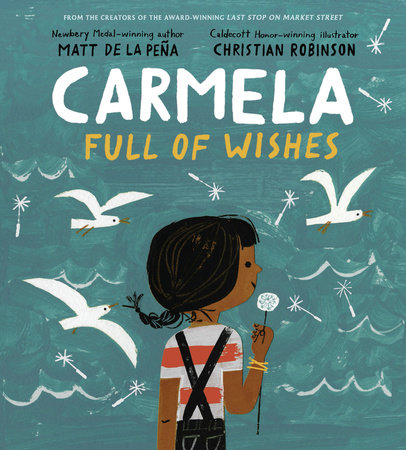 Carmela Full of Wishes
Carmela Full of Wishes
Written by Matt de la Peña
Illustrated by Christian Robinson
G. P. Putnam’s Sons, 2018, 40 pp
ISBN: 9780399549045
Matt de la Peña carefully words this simple and lyrical text to introduce Carmela as she celebrates her birthday with her mother and older brother. Now that Carmela is older, she can run errands across their farming town with her brother, but he is not happy about having Carmela tag along. Carmela picks a dandelion that she finds outside the laundromat and is quickly informed by her brother that she must make a wish. The condescending tone of her brother’s voice leads Carmela to lie and respond that she has already wished for something. Now that Carmela is ready to make a wish the possibilities are endless, and she considers potential wishes. At first her wishes are ordinary and playful dreams of candy but soon those wishes focus on her family. She wishes that her mom could sleep in a fancy bed like the one in the hotel where she works, that her dad can fix his papers (obtain legal documents such as residency or citizenship so the family can be reunited) or even that her brother will transform into something undesirable. The potential wish feels more like a responsibility, and she dreads making a choice for fear of a wrong decision. Then, the unexpected happens and she falls. She can endure the pain of the fall, but it is the destruction of the dandelion and the unexpected inability of making a wish that breaks her heart. Carmela is devastated but her brother sets aside his frustrations with Carmela to provide comfort and the possibility of new wishes.
Carmela Full of Wishes can encourage young readers to relate to the excitement of growing up and learning to do new things or arguing with siblings but still loving each other unconditionally. The story also addresses complex social issues related to rivalry between siblings and the cultural experiences of immigrants and migrant workers. The book also delicately presents the topic of deportation and how it results in painful family separation, anxiety, and first-generation trauma. Another social issue explored is the working conditions of marginalized individuals with low wages and job instability. Carmela Full of Wishes has a powerful message that transmits the love of immigrant families and their struggles. The perseverance of Mexican American migrant workers, hard working parents, and loving siblings are what drive Carmela’s wishes.
The colorful and sophisticated acrylic and digitized illustrations by Christian Robinson capture the attention of children by providing ample information about the setting and Carmela’s wishes and emotions. Thus, the illustrations are just as central to the text as the written story to construct meaning and capture the setting and Carmela’s wishes. The first pages depict the fields of Watsonville, California as the backdrop to Carmela’s story. Through the illustrations the reader can experience and walk through a farming community. The colorful illustrations are representative of Mexican American culture (for example, the wishes that Carmela imagines are represented in papel picado or the color paper banners used in Mexican celebrations).
Carmela worries about making the wrong wish and has conflicted emotions about what to wish for herself and her family. Her wishes are centered on her family reunification and financial opportunities. A book pair that discusses the topic of family separation is Mama’s Nightingale: A Story of Immigration and Separation by Edwidge Danticat and Leslie Staub (2015). A book pair that touches on the first-generation immigrants is Dreamers by Yuyi Morales (2018) and is a suitable companion book to discuss themes of community and family. The theme of family unity and siblings providing unconditional support and love can be further explored with Maple and Willow Together by Lori Nichols (2014).
Mexican American author Matt de la Peña has published seven novels and six picturebooks that explore issues around diversity, inequality, injustice, and immigration, among others. He is a New York Times Bestselling author and recipient of the 2016 Newberry Medal Award and 2016 NCTE Intellectual Freedom Award. He teaches creative writing and visits schools to promote literacy. The text is congruent with his philosophy that children should not be shielded from complicated topics because literacy is a path to help children share their experiences to support their emotional development. He suggests that multicultural books also need to address complex issues to identify universal human experiences (de la Peña, 2018; 2021).
Christian Robinson has illustrated several honored books and a solo project that was named New York Times Best Illustrated Book of 2019. He has two additional collaborations with Matt de la Peña including Last Stop on Market Street (2016) and Milo Imagines the World (2021). Robinson believes that sharing personal experiences, specifically those that are painful and confusing, can be healing opportunities, initiate conversations, and help children develop empathy (The Art of Fun, n. d.).
References
de la Peña, M. (2021). Bio. https://mattdelapena.com/bio/
de la Peña, M. (2018). Why we shouldn’t shield children from darkness. Time. https://time.com/5093669/why-we-shouldnt-shield-children-from-darkness/
The Art of Fun. (n. d.). About Christian Robinson. https://www.theartoffun.com/about
Rocio Almanza, Texas A&M-Commerce
Authors retain copyright over the vignettes published in this journal and grant the journal right of first publication with the work simultaneously licensed under the following Creative Commons License:
WOW Review, Volume XIV, Issue 3 by Worlds of Words is licensed under a Creative Commons Attribution-NonCommercial-ShareAlike 4.0 International License. Based on work at https://wowlit.org/on-line-publications/review/xiv-3/3
WOW review: reading across cultures
ISSN 2577-0527
